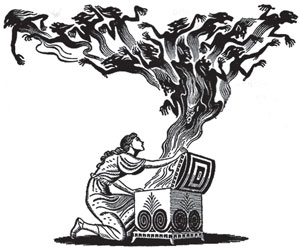Drink deep in the river of classics
 About five or six decades ago, students offering English for their
degree were encouraged to do classics. Some students used to ask the
professor, “Why classics?” About five or six decades ago, students offering English for their
degree were encouraged to do classics. Some students used to ask the
professor, “Why classics?”
The bespectacled professor looked at them hard and said, “Classics
mean the study of ancient Greek and Roman culture, especially their
languages and literature.” He reminded them that S.W.R.D. Bandaranaike
studied classics at Oxford University. The study of Western Classical
Culture made him a brilliant English speaker and writer. There were
others who read classics at Peradeniya and Kelaniya Universities.
However, today’s university students do not seem to have a soft corner
for classics.
With the introduction of Information Technology and a host of science
subjects, Western Classical Culture has been thrown to the back seat.
Today’s university students know that a knowledge of classics is not
going to earn their bread and butter. So, they leave classics to old
blokes who prefer to drink deep in Greek and Roman literature. In the
Digital Age, pulp novels are leagues ahead of classical literature.
Celebrated writers here and abroad are well versed in classical
literature. It is a rule of the thumb that those who do not have even a
nodding acquaintance of Greek and Roman literature should not dabble in
writing. Putting together English words and sentences will not make
anyone a good writer. Effective writing needs a deep knowledge of
classical literature. Greek and Roman classical tales have inspired many
speakers and writers.
Fiddler in Rome
Most of us have heard the expression “to fiddle while Rome was
burning.” It simply means doing nothing or having a good time when you
are faced with a grave problem. The striking image of the fiddler comes
from a legend that says the Roman emperor Nero ignored a fire that was
destroying huge chunks of the city of Rome. Instead of trying to douse
the fire, Nero preferred to spend his time playing the fiddle or the
violin.
 |
|
Pandora opened the box
and evils escaped into the world |
Some historians, however, say that Nero cared for his people. He was,
of course, fond of music and the violin had not been invented yet. Nero,
in fact, helped the citizens after the city was destroyed by fire.
Whatever that may be, Nero has gone down in history as a happy-go-lucky
emperor who was selfish to his marrow bone!
On many occasions we have heard the expression, “opening a Pandora’s
box,” when we invite a lot of unexpected troubles. The origin of the
expression can be traced to a Greek legend according to which the Titan
god Prometheus stole fire from heaven and gave it to mankind. It
infuriated Zeus, the king of the gods.
He chained Prometheus to a rock and sent birds to eat his liver every
day. Zeus then created Pandora, the first woman, and sent her to
Prometheus’s brother Epimetheus as a gift. Zeus gave the girl a closed
box and told her that it contained her dowry and it must not be opened.
As might be expected, Pandora slowly opened the box and hate, jealousy
and other evils escaped into the world. However, Pandora also let out
hope. Therefore, mankind is not doomed to despair.
Fabian tactics
Another expression we use today is “Fabian tactics.” When you adopt
Fabian tactics, you avoid direct confrontation to wear out the enemy.
The term is also used to refer to patient, long-term planning to achieve
a difficult object. Unknown to many of us, the phrase goes back to the
third century BC when the Roman General Fabius Maximus battled against
Hannibal of Carthage. Knowing that Hannibal was a formidable enemy,
Fabius Maximus did not engage in a direct confrontation. He instructed
his men to ambush Carthaginian soldiers and conduct hit-and-run raids.
Fabius eventually wore down Hannibal and won the war. However, it took a
long time to do so.
When we refer to a precarious or potentially dangerous situation we
use the phrase “Sword of Damocles.” Its origin too is quite interesting.
When Damocles pestered King Dionysius I with constant speeches about the
joys of royal power, the king decided to teach him a lesson. He invited
Damocles to a banquet and casually pointed to a sword that was suspended
above his head by a single strand of hair. The king told him that the
sword represented the danger that comes with great power. According to
the legend, Damocles could not enjoy the banquet!
There are many such legends and stories waiting to be picked up by
those who care to drink deep in the river of Western Classical Culture!
|



